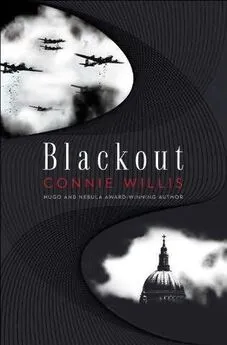Connie Willis - Blackout
- Название:Blackout
- Автор:
- Жанр:
- Издательство:неизвестно
- Год:неизвестен
- ISBN:нет данных
- Рейтинг:
- Избранное:Добавить в избранное
-
Отзывы:
-
Ваша оценка:
Connie Willis - Blackout краткое содержание
In her first novel since 2002, Nebula and Hugo award-winning author Connie Willis returns with a stunning, enormously entertaining novel of time travel, war, and the deeds—great and small—of ordinary people who shape history. In the hands of this acclaimed storyteller, the past and future collide—and the result is at once intriguing, elusive, and frightening.
Oxford in 2060 is a chaotic place. Scores of time-traveling historians are being sent into the past, to destinations including the American Civil War and the attack on the World Trade Center. Michael Davies is prepping to go to Pearl Harbor. Merope Ward is coping with a bunch of bratty 1940 evacuees and trying to talk her thesis adviser, Mr. Dunworthy, into letting her go to VE Day. Polly Churchill’s next assignment will be as a shopgirl in the middle of London’s Blitz. And seventeen-year-old Colin Templer, who has a major crush on Polly, is determined to go to the Crusades so that he can “catch up” to her in age.
But now the time-travel lab is suddenly canceling assignments for no apparent reason and switching around everyone’s schedules. And when Michael, Merope, and Polly finally get to World War II, things just get worse. For there they face air raids, blackouts, unexploded bombs, dive-bombing Stukas, rationing, shrapnel, V-1s, and two of the most incorrigible children in all of history—to say nothing of a growing feeling that not only their assignments but the war and history itself are spiraling out of control.
Blackout - читать онлайн бесплатно полную версию (весь текст целиком)
Интервал:
Закладка:
She did, but her mind was on what Sir Godfrey’d said: “No one has any idea where you are.”
They’d thought Marjorie’d gone to Bath when she was actually buried under a wall in Jermyn Street. Could the same thing have happened with Polly’s retrieval team? Could they have seen or heard something that made them reach an erroneous conclusion about where she was? Could they be off looking for her on Regent Street or in Knightsbridge? Or another city?
But she hadn’t gone off without telling anyone where she was going, like Marjorie, and she hadn’t been blown off-course. She was exactly where she’d told the lab-and Colin-she’d be: working in a department store on Oxford Street and sleeping in a tube station that had never been hit. And Doreen’s having come to Notting Hill Gate to tell her about Marjorie proved that Townsend Brothers knew how to find her if the retrieval team asked for her. And this was time travel-
“Wrong, wrong, wrong!” Sir Godfrey bellowed. Polly scrambled to find her place, but this time he was yelling at the rest of the cast. “Your chances of rescue are nearly nonexistent. You’re far from the shipping lanes, and when word of the loss of your ship reaches England, you will almost certainly be given up for dead.”
Given up for dead. What if, rather than thinking she was somewhere else, the retrieval team thought she was dead? When Doreen had first told her about Marjorie, she’d thought she was dead, and when she’d seen the wreckage of St. George’s, she’d thought Sir Godfrey and the others were. And they’d thought she was dead, too. Sir Godfrey had insisted that the rescue squad dig for her. What if, during that time the retrieval team had come, and the rector had told them she was dead? Or what if he’d-?
“Miss Laburnum,” she whispered, “after St. George’s was destroyed, did you-?”
“Lady Mary, did you have some comment on this scene?” Sir Godfrey asked, his voice dripping with sarcasm.
“No. I’m sorry, Sir Godfrey.”
“As. I. Was. Saying,” Sir Godfrey said, emphasizing each word, “only the butler, Crichton, and Lady Mary,” he glowered at her, “have realized the gravity of their plight at this point, and it is that which provides the humor, such as it is, in this scene. Lady Agatha, you stand here,” he said, taking Lila by the arm and moving her to the end of the platform, “and Lord Brocklehurst, you’re seated here in front of her on the sand.”
Polly took advantage of his repositioning the cast to ask Miss Laburnum, “When I was missing, did the rector send my name to the newspaper for the casualties list?”
Miss Laburnum shook her head. “Mrs. Wyvern thought it was our duty to send in a death notice,” she whispered, “but Sir Godfrey wouldn’t hear of it. He-”
“Mary!” Sir Godfrey thundered. “If you don’t mind, I’d like to rehearse this scene before the end of the war.”
“Sorry.”
They started through the scene. Polly forced herself to concentrate on saying her lines and getting through her blocking without incurring Sir Godfrey’s wrath again, but as soon as rehearsal was over, she took the tube to Holborn’s lending library to look at its old newspapers. Mrs. Wyvern might not have notified officials of her death, but that didn’t mean the incident officer-or one of the ARP wardens-hadn’t. Or she might have been mentioned in the account of the church’s destruction. And if the retrieval team had seen “Polly Sebastian, died suddenly of enemy attack” in the Times-”
But the oldest paper the library had was three days old. “You haven’t any from farther back?” she asked the librarian.
“No,” she said apologetically. “Some children came round several days ago collecting for the scrap paper drive.”
She’d have to go to the Times office herself. But when? The newspaper morgue wasn’t open Sundays, her only day off, and her lunch break wasn’t long enough for her to go all the way to Fleet Street and back. And Polly didn’t dare phone in again and say she was ill. Miss Snelgrove was convinced anyone who asked for time off was decamping like Marjorie.
But she had to see those casualties lists, so after rehearsal the next night she borrowed Sir Godfrey’s Times to find a death notice she could use, borrowed a handkerchief from Miss Laburnum, and waited for Friday night when the raids over Clerkenwell would hopefully prevent Miss Snelgrove from getting to work on time the next morning.
They did. Polly grabbed the handkerchief and ran upstairs to Personnel to ask Mr. Witherill if she could be gone for the morning. “To attend my aunt’s funeral.”
“You must obtain permission from your floor supervisor.”
“Miss Snelgrove’s not here.”
He glanced over at his secretary, who nodded confirmation. “She telephoned to say the trains weren’t running, and she was going to attempt to take a bus.”
“Oh. Your aunt, you say?”
“Yes, sir. My Aunt Louise. She was killed in a raid.” She dabbed at her eyes with the handkerchief.
“My condolences. When is the funeral?”
“Eleven o’clock at St. Pancras Church,” Polly said, and if Mr. Witherill (or, more likely, Miss Snelgrove) checked the funeral notices, they would find “Mrs. James (Louise) Barnes, aged 53, St. Pancras Church. 11 A.M. No flowers.”
“Very well,” he said, “but I expect you to return immediately after the funeral.”
“Yes, sir, I will,” Polly said and ran down to tell Doreen where she was going and to tell anyone who inquired after her that she’d be back by one, took the tube to Fleet Street, and walked quickly to the Times office, hoping ordinary people were allowed access to the morgue.
They were. She asked for the morning and evening editions from September twentieth through the twenty-second and was shocked to be handed the actual newspapers-though this was of course before digital copying or even microfilm. She paged through the large sheets, looking for the death notices and reading down through them-“Joseph Seabrook, 72, died suddenly of enemy action. Helen Sexton, 43, died suddenly. Phyllis Sexton, 11, died suddenly. Rita Sexton, 5, died suddenly.”
Polly’s name wasn’t on any of the lists, and the news article was only a brief paragraph headed “Beloved Eighteenth-Century Church Blitzed”. There were no details, no photo, not even the name of the church.
Good, she thought. She returned the papers to the desk and went on to the Daily Herald, checking the news story about St. George’s-“Fourth Historic Church Destroyed by Luftwaffe in Failed Campaign to Demoralize Brits”-and the death notices. Her name wasn’t there either, or in the Standard, which was all she had time to check. She would have to check the others later.
She raced back to Townsend Brothers, stopping at Padgett’s to rub a bit of rouge around her eyes in the ladies’ lounge and splash water on her eyelashes, cheeks, and handkerchief. And a good thing she had. Miss Snelgrove had arrived and clearly did not believe she’d been to a funeral.
And Colin wouldn’t believe I was dead either, she thought, even if he did see my death notice. Colin would refuse to give up. He’d insist they continue looking for her just as Sir Godfrey had.
Then where are they? she thought, writing up purchases and waiting for Miss Snelgrove to leave so she could ask Doreen whether anyone had asked for her while she was gone. Why aren’t they here? It had been nearly four weeks since the drop was damaged and five since she should have checked in.
She had to wait till after the closing bell to speak to Doreen. Doreen told her no one had come in and asked her about Marjorie. “Miss Snelgrove said she won’t be well enough to have visitors for at least a fortnight,” she said. “You don’t think it means she’s getting worse, do you?”
“No, of course not,” Polly lied.
“I keep thinking about her lying in that rubble and us not knowing what had happened,” Doreen said, “thinking she was safely in Bath when all the time… I feel so guilty not sensing she was in trouble.”
“You had no way of knowing,” Polly said, which seemed to reassure her. She went off to cover her counter, but Polly stood there, lost in thought.
No way of knowing. What if the reason the retrieval team hadn’t come wasn’t divergent points or their thinking she was dead or any of the other things she’d imagined? What if it was simply because the lab didn’t know they needed to send a team? That they didn’t know anything was wrong? Like I didn’t know Marjorie was lying in the rubble.
The lab had been swamped with retrievals and drops and schedule changes, and Mr. Dunworthy had been busy as well, meeting with people and going off to London. Could they all have been so busy and distracted they’d forgotten she was supposed to check in? Or could something have happened to Michael Davies at Dover or Pearl Harbor, and everyone’s attention was on pulling him out, and they’d put every other retrieval on hold?
If that was the case, they wouldn’t find out her drop wasn’t working till the day she was supposed to be back. Which meant they’d be here on the twenty-second, and all she needed to do was last a few more days. No, she was forgetting Colin. No matter what was distracting other people, he wouldn’t have forgotten about her. He’d have been at the lab every day, demanding to know whether she’d checked in. And when she didn’t, he’d have gone straight to Mr. Dunworthy.
No, wait, he couldn’t. He wasn’t allowed in the lab.
That wouldn’t stop him, Polly thought. Unless Colin himself was the distraction. He’d been determined to go on assignment so he could “catch up” to her. What if he’d gone through the net without permission to the Crusades or something, and they’d had to send a retrieval team to fetch him, or Mr. Dunworthy had gone after him? And in all the resultant chaos they’d completely forgotten about her? It was all too likely a scenario, and she spent the time till the twenty-second worrying about Colin. And Marjorie.
October twenty-second came and went without the retrieval team appearing. It will take them time to find me, she told herself, ignoring the laws of time travel and the trail of bread crumbs she’d so carefully laid. They’ll be here tomorrow.
But they weren’t, nor on the twenty-fourth. Or outside Notting Hill Gate the next morning. And it’s a good thing I didn’t apply for that position at Padgett’s, Polly thought, walking past the store on her way to Townsend Brothers. Tonight was the night it had been bombed. A direct hit by a thousand-pound HE had demolished the building, and because it had been hit just after closing and there were still people in the building, there’d been three deaths.
Polly stopped to take a last look at the store’s grandiose columns, at its glass display windows and the mannequins dressed in wool coats and small-brimmed felt hats. “End-of-Summer Sale,” a banner read. “Last chance to buy at these prices.”
Or to do anything else, Polly thought, wondering who the three fatalities had been. Late shoppers? Or junior sales assistants who’d had to stay behind to add up their sales receipt books or wrap parcels?
I’d best put my hat and coat behind the counter tonight and take the tube instead of the bus. Unless the retrieval team’s waiting for me when I get to work, she thought, walking the last three blocks to Townsend Brothers.
But they weren’t there. Where are they? Polly thought sickly, going up to third. Where are they?
There was four and a half days’ slippage when I came through, she told herself, uncovering her counter. If they’d tried to come through on the twenty-second and had encountered the same amount of slippage, they wouldn’t be here till tomorrow night.
Читать дальшеИнтервал:
Закладка:

![Jane_BlackCat - Понять не поздно... [СИ]](/books/1148838/jane-blackcat-ponyat-ne-pozdno-si.webp)
![Jane_BlackCat - За краем Вечности [СИ]](/books/1148839/jane-blackcat-za-kraem-vechnosti-si.webp)

